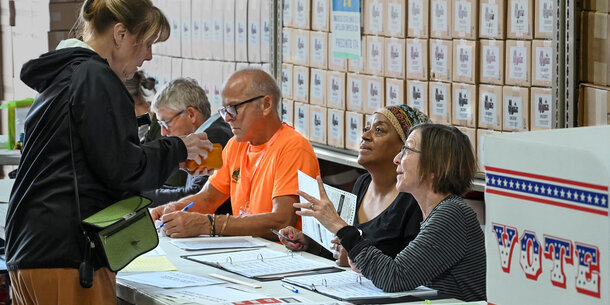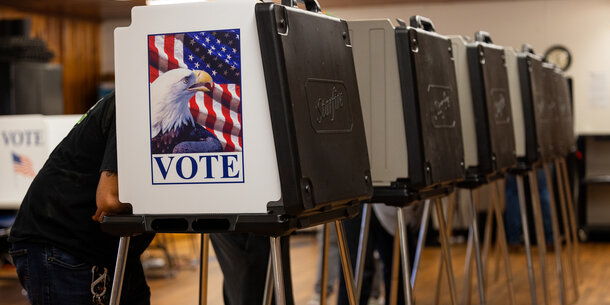Click here for the most recent Voting Laws Roundup.
The state legislative push to restrict voting and undermine faith in elections has moved at a near-record pace this year, driven by a still-active election denier movement. At the same time, the pro-democracy movement has continued to press for legislation to boost voting access.
Thus far, more expansive laws have passed than restrictive and election interference laws. The geographical divide of previous years persists, with expansive legislation tending to pass in some states while restrictive legislation tends to pass in other states.
Just under a third of state legislatures are still in session this year. Between January 1 and May 29, 2023, the following voting legislation has passed:
- At least 11 states enacted 13 restrictive laws.footnote1_G4-h5pv5bZYxqdOYhfdXeyTbKu9eZU2lpd1IrzfWaeA_zLC6NRLpG5J71 AR H.B. 1411, FL S.B. 7050, ID H.B. 124, ID H.B. 340, IN H.B. 1334, KS S.B. 106, MS H.B. 1310, NM S.B. 180, ND H.B. 1431, SD H.B. 1165, UT S.B. 17, WY H.B. 279, WY S.F. 153. Two more restrictive bills in two states were passed by both chambers of the legislature and are awaiting the governors’ approval.footnote2_p2sFqwporuU4pn947Krhk0wYHj9-yGUvhGKp3Y-8nc_njApVhVIcxHr2 OK S.B. 377, TX S.B. 924. OK S.B. 377 was signed by the governor after the cutoff date of this report. Legislation is categorized as restrictive if it contains one or more provisions that would make it harder for eligible Americans to register, stay on the voter rolls, or cast a ballot as compared to existing state law.
- At least four states enacted five election interference laws.footnote3_Abqxk9IJFxBF-I3FgWze3W9GU25Nxd9umF2KBVSm6gM_tUudX5AKSFZx3 AR H.B. 1411, AR S.B. 272, FL S.B. 4-B, GA S.B. 222, SD H.B. 1165. An additional bill in Texas was passed by the legislature and is awaiting the governor’s signature.footnote4_WptN9yHwd1ROVAWXW7D-H1scsXUWD5stfhIWhJNzevs_l4QWdUtdsESA4 TX S.B. 1933. Legislation is categorized as election interference if it either threatens the people and processes that make elections work or increases opportunities for partisan interference in election administration or outcomes.
- At least 13 states enacted 19 expansive laws.footnote5_CVNNJj5E8lb9gixk90yYJofhdjVPcV9CSJhYtdZnMnk_cFpy5ZSHEpOQ5 AR H.B. 1512, AR S.B. 247, GA S.B. 129, KS S.B. 221, MD H.B. 410, MI S.B. 259, MN H.F. 3, MN H.F. 28, NM H.B. 4, NM S.B. 180, NY S.B. 1327, UT H.B. 37, UT S.B. 17, VA H.B. 1948, WA H.B. 1048, WA S.B. 5112, WA S.B. 5208, WV S.B. 631, WY H.B. 79. An additional four bills in two states were passed by the legislature and are awaiting the governors’ approval.footnote6_sfDX0Jg3d03pQ53fghKAmqkPdL9ZLaCp2-KA1FFqizM_v9WbcFRj1qjw6 CO S.B. 276, TX S.B. 1599, TX S.B. 477, TX H.B. 1217. CO S.B. 276 and TX H.B. 1217 were signed by the respective states’ governors after the cutoff date of this report. Legislation is categorized as expansive if it contains one or more provisions that would make it easier for eligible Americans to register, stay on the rolls, or cast a ballot as compared to existing state law.
One troubling development: lawmakers have begun to target direct democracy, aiming to limit ways that voters can pass ballot measures. Another notable trend in voting legislation this year is a continued push to criminalize election-related activities. And in Texas, the legislature has considered multiple bills that would hamper election administration in Harris County, a trend that is unusual in its targeting of one particular county.
Meanwhile, several states have taken steps to provide legal protections for election workers as they face increased threats to their safety.
End Notes
-
footnote1_G4-h5pv5bZYxqdOYhfdXeyTbKu9eZU2lpd1IrzfWaeA_zLC6NRLpG5J7
1
AR H.B. 1411, FL S.B. 7050, ID H.B. 124, ID H.B. 340, IN H.B. 1334, KS S.B. 106, MS H.B. 1310, NM S.B. 180, ND H.B. 1431, SD H.B. 1165, UT S.B. 17, WY H.B. 279, WY S.F. 153. -
footnote2_p2sFqwporuU4pn947Krhk0wYHj9-yGUvhGKp3Y-8nc_njApVhVIcxHr
2
OK S.B. 377, TX S.B. 924. OK S.B. 377 was signed by the governor after the cutoff date of this report. -
footnote3_Abqxk9IJFxBF-I3FgWze3W9GU25Nxd9umF2KBVSm6gM_tUudX5AKSFZx
3
AR H.B. 1411, AR S.B. 272, FL S.B. 4-B, GA S.B. 222, SD H.B. 1165. -
footnote4_WptN9yHwd1ROVAWXW7D-H1scsXUWD5stfhIWhJNzevs_l4QWdUtdsESA
4
TX S.B. 1933. -
footnote5_CVNNJj5E8lb9gixk90yYJofhdjVPcV9CSJhYtdZnMnk_cFpy5ZSHEpOQ
5
AR H.B. 1512, AR S.B. 247, GA S.B. 129, KS S.B. 221, MD H.B. 410, MI S.B. 259, MN H.F. 3, MN H.F. 28, NM H.B. 4, NM S.B. 180, NY S.B. 1327, UT H.B. 37, UT S.B. 17, VA H.B. 1948, WA H.B. 1048, WA S.B. 5112, WA S.B. 5208, WV S.B. 631, WY H.B. 79. -
footnote6_sfDX0Jg3d03pQ53fghKAmqkPdL9ZLaCp2-KA1FFqizM_v9WbcFRj1qjw
6
CO S.B. 276, TX S.B. 1599, TX S.B. 477, TX H.B. 1217. CO S.B. 276 and TX H.B. 1217 were signed by the respective states’ governors after the cutoff date of this report.





